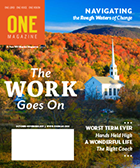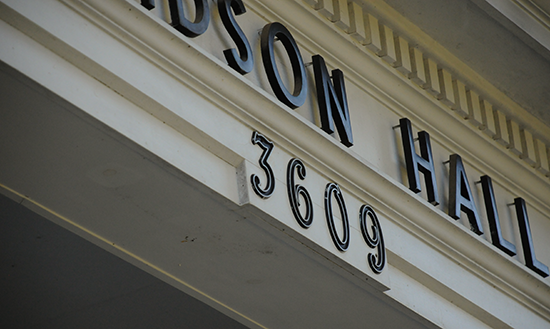
October-
November 2017
The Work Goes On
------------------
|






INTERSECT: Richer One College, Poorer One Student
In each issue of ONE Magazine, Welch College contributes the Intersect column. In this issue, as the College celebrates its 75th year, the following special edition of Intersect recalls the brave young lady whose words were instrumental in bringing the school to reality.
- - - - - - - - - -
In July 1939, the hot Texas sun looked down on Free Will Baptists from across the nation converging on the Free Will Baptist Church of Bryan. Many were excited about the upcoming meeting, but concern was also in the air.
Only four years earlier, in Nashville, Tennessee, the General Conference of Free Will Baptists joined with the Cooperative General Association of Free Will Baptists to form the National Association of Free Will Baptists. That year, the Committee on Education, the first board formed by the new association, recommended founding a denominational school in Nashville to begin classes in September 1936. The committee was approved to raise funds toward this end and to purchase property for the institution. Nearly four years later, the college was still only a dream.
The primary problem was funding. In the midst of the Great Depression, Free Will Baptists were slow to back their educational desires with the requisite finances. Though the Board of Education diligently promoted the work after three years, they had only $1,000 in the bank and $200 in pledges.
That first morning, during the 1939 business session, J. R. Davidson’s report as chairman of the Board of Education was optimistic and encouraging, but the congregation must have been disappointed by the lack of progress. One young lady certainly was. After Davidson’s report, Jean Welch, the 16-year-old daughter of John L and Mary Ann Welch, stood and asked for permission to address the gathered body on behalf of her generation.
The young woman emphasized her Free Will Baptist heritage, stating that she was “rocked in a Free Will Baptist cradle, [and] raised in a Free Will Baptist parsonage.” She and her fellow students had talents to offer to the denomination, but they lacked training. “Where will they get this training?” she asked. “Methodists, Presbyterians, [and] other Baptists are not responsible for educating Free Will Baptist youth. You, my dear people, are responsible.”
Jean noted that a student’s school deeply influences his or her denominational loyalty. “Will [our young people] be educated in Methodist schools to become Methodists?” she pointedly asked. Jean closed her short speech by asking if she would have a chance to study and train in a Free Will Baptist college. [1]
As Jean took her seat, the ministers and delegates began to realize the full weight of the Free Will Baptist educational need. George Dunbar stood and offered prayer for the denomination’s educational work. After Dunbar closed the prayer, “a great educational rally such as many had never experienced before” broke out. The congregation took up an offering of $284.35 for the educational work, and $1,725 in pledges were given (equal to $5,000 and $30,000 respectively in today’s inflated dollars). This offering nearly tripled the fundraising efforts of the previous four years combined!
Several men and women mentioned Jean’s speech in fundraising efforts over the following months and years. Her words touched the collective conscience of Free Will Baptists and spurred the denomination to commit fully to educational work. Just over three years later, Linton C. and Ruth Johnson turned onto Richland Avenue, stopping in front of a grey-stone building where Paul Ketteman, the school’s first student, sat waiting on the steps. Welch College’s 75-year history was about to commence.
The ending to this story is bittersweet, however. The young woman who ignited a passion for a Free Will Baptist college did not enjoy the fruit of her labor. Jean had to choose a college before 1942, ending up at Asbury College, a Methodist institution. While there, she met a fine young man training to become a Methodist minister, and they were soon married. Her speech left Free Will Baptists richer one college, but poorer one promising young person.
About the Writer: Phillip Morgan graduated from Welch College in 2008 with a B.S. in Biblical Studies and Piano and Organ Performance. He recently completed an M.A. in History at Middle Tennessee State University and teaches at Welch College. Learn more: www.Welch.edu.
1 Mary Ruth Wisehart, “Education in the Palmer Movement” (Presentation for Heritage Week at Free Will Baptist Bible College, February 3, 1993), 15, in NAFWB Historical Collection. |
|

